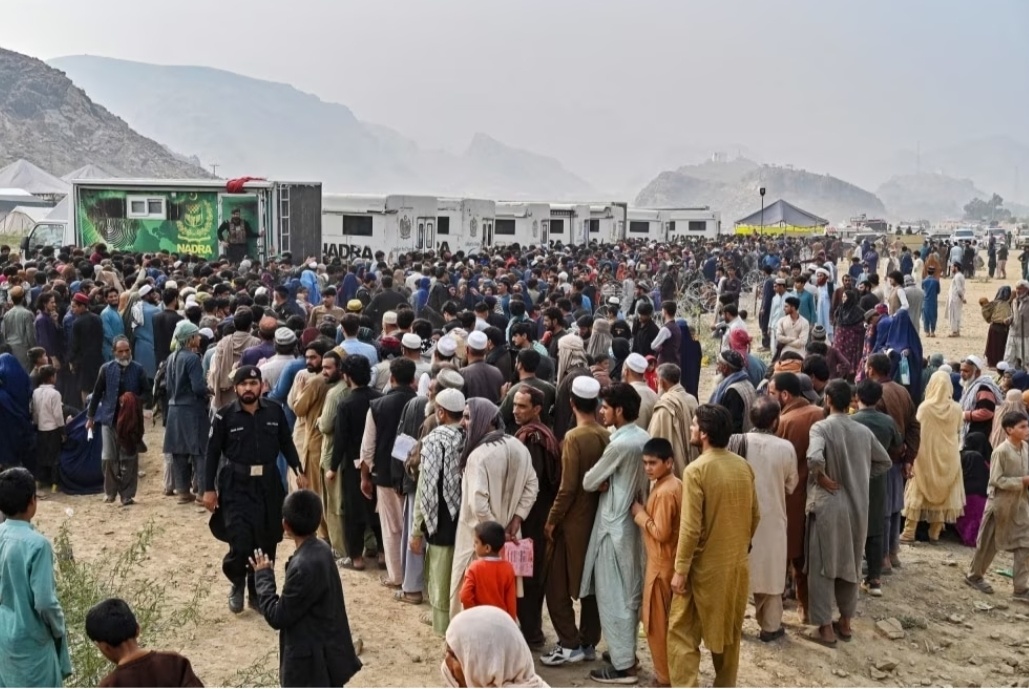As 28-year-old Zabihullah recalls his ordeal, “Police snatched my money, I had to sell my belongings in order to come home with my family”, his situation represents the anguish felt by many refugees who are forced to flee their homes under coercion. With changing geopolitics and domestic policy developments, Pakistan’s current approach to Afghan refugees has been a source of global concern. This article goes into the multiple aspects of the issue, presenting a complicated blend of legal, humanitarian, and geopolitical concerns.
Following the expiry of Pakistan government’s given deadline, it is expulsing all its Afghan refugees. Reason being Pakistan’s unsubstantiated claims of illegal Afghan nationals being engaged in criminal activities within the country, such as insurgent attacks and smuggling.However, the Taliban government has denied these charges. Though Pakistan is not a signatory of the 1951 Refugee Convention or its 1967 Protocol, it is obligated by the principle of non-refoulment, which prevents the deportation of refugees to places where they would clearly suffer substantial risks to their lives. Pakistan’s commitment to a tripartite agreement with Afghanistan and the UNHCR, which includes cooperation on the security and safe repatriation of Afghan refugees also appears to be jeopardised. The international community has been debating the unfolding events in Pakistan. It was reported by The Guardian that Pakistan has begun detaining and deporting Afghan migrants who missed the deadline to leave the country with NGOs around the globe pressing on the government of Pakistan to put an end to the ongoing detentions, deportations, and widespread harassment of Afghan refugees.
In the prevailing scenario, individuals found to be staying in Pakistan without the requisite documents are subject to detention and deportation. Despite Pakistan’s caretaker Interior Minister, Sarfraz Bugti’s claim that refugees will be dealt with dignity and without ill treatment, a closer look at past events casts doubt on the validity of such promises. From the previous deportation of Afghans in 2016, a number of human rights organisations reported the severe abuse of power practiced by Pakistan’s police force. Human Rights Watch (HRW) described the expulsion as ‘the world’s largest unlawful mass forced return of refugees in recent years’. Whether registered or not, Afghan refugees are facing the prospect of imprisonment or deportation. According to Human Rights Watch, Afghans are arrested regardless of whether they have a valid visa or a Proof of Registration (PoR) card and are often forced to pay bribes to be released. Amidst endless issues already coexisting, Pakistan’s police frequently subject Afghan women refugees to sexual harassment complicating the challenges they are already facing. These activities were carried out by the caretaker regime, with the help of the military, in order to circumvent the elected government. This move is viewed as a calculated attempt to avoid accountability. Lawyers’ ability to represent refugees has been restricted, severely limiting the refugees’ legal options. The restricted access of lawyers to detention centers has raised apprehensions for the transparency and accountability of the detention processes. The Sindh High Court’s statement that the petitioners are not directly affected and that non-Pakistani citizens cannot claim the fundamental right is a clear example of how Pakistan has discriminated against Afghan refugees. The socioeconomic effects on Afghan refugees have exacerbated their situation. Pakistan’s handling of the matter has only worsened the distress of people who were once welcomed in the country as victims of war crimes. An inhumane example of this is the callous imposition of a $830 ‘overstay tax’ on people seeking to migrate to Western countries. Deliberate efforts by the government and the police to slow down visa issuance and intentionally demolishing detention centers are part of their strategies to bother and pressurise the Afghan refugees. One other justification used by Pakistan to rationalize their behavior was their fear of potential attacks by the Tehreek-e-Taliban Pakistan (TTP).
Prominent international organisations, including the World Health Organisation and the United Nations Human Rights Chief, have highlighted concerns about the refugee crisis, noting both public health effects and reported human rights violations. The World Health Organisation, in particular, has highlighted the growing possibility of disease outbreaks and the spread of poliovirus among returning refugees, emphasising the critical nature of the situation.
The issue of Afghan refugees in Pakistan exemplifies the complex interplay of legal, humanitarian, and geopolitical factors. As the situation progresses, it is about time the international community intervenes proactively, ensuring that refugees’ rights and dignity are not just preserved but actively defended. The situation of Afghan refugees in Pakistan is a wake-up call for a more humanitarian and legally sound approach to refugee management worldwide. The forced deportation of over a million Afghans has not only violated international law, but it has also sparked a large-scale humanitarian crisis. To many refugees, Afghanistan’s repatriation policy is like returning to their ‘homeland’ which was never their home in the first place. Pakistan has always been their only home with their families living there for past few generations. Rather than taking meaningful steps to try and strengthen its military, Pakistan’s caretaker government chose to react by abusing society’s most vulnerable group of people. In conclusion, instead of imposing its own security failures on Afghan refugees, Pakistan should acknowledge its utter violation of human rights convention.
The author is a first year BA LLB student at Jindal Global Law School, Sonipat. She is currently interning with Assistance and Promotion of Afghan Women, an international NGO promoting women’s rights.

